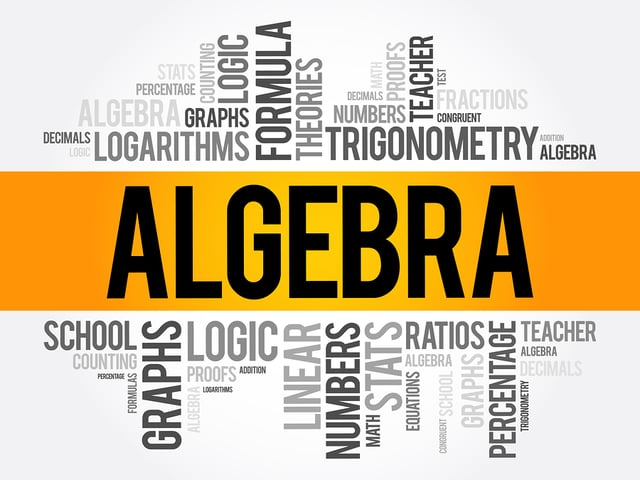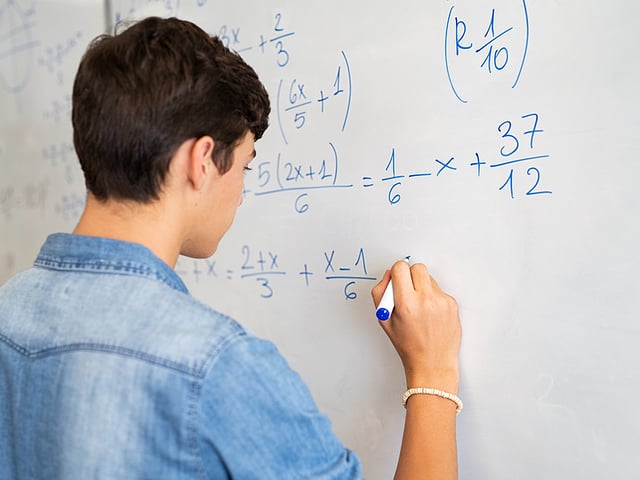
Important Algebra Formulas to Know for the ISEE Math Tests
Is it easy to remember everything you’ve learned in school? Of course not! The two math tests on the ISEE Quantitative Reasoning and Mathematics Achievement will put your math knowledge to the test. Don’t worry if you don’t recall everything. Union Test Prep has you covered. We have formula charts for all four math areas assessed by the ISEE Math tests.
The Algebra chart is below and you can find the others at these links:
For more information, feel free to check out our FREE study guides, practice questions, and flashcards.
Algebra Formulas for the ISEE Math Tests
| Category | Formula | Symbols | Comment |
|---|---|---|---|
| General Algebra |
\(x+a=b \Rightarrow x=b-a\) \(x-a=b \Rightarrow x=b+a\) \(x \cdot a=b \Rightarrow x=b \div a\) \(x \div a=b \Rightarrow x=b \cdot a\) \(x^a=b \Rightarrow x = \sqrt[a]{b}\) \(\sqrt[a]{x}= b \Rightarrow x= b^a\) \(a^x=b \Rightarrow x=\frac{log\ b}{log\ a}\) |
a, b = constants x = variable |
|
| General Algebra |
\(x^a \cdot x^b = x^{a+b}\) | a, b, x = any real number | |
| General Algebra |
\(\frac{x^a}{x^b}=x^{a-b}\) | a, b, x = any real number | |
| General Algebra |
\((x^a)^b = x^{a \cdot b}\) | a, b, x = any real number | |
| General Algebra |
\((x \cdot y)^a = x^a \cdot y^a\) | a, b, x = any real number | |
| General Algebra |
\(x^1 = x\) | x = any real number | |
| General Algebra |
\(x^0 = 1\) | x = any real number | |
| General Algebra |
\(x^{-a} = \frac {1}{x^a}\) | a, x = any real number | |
| General Algebra |
\(x^{\frac {a}{b}} = \sqrt[b]{x^a} = (\sqrt[b]{x})^a\) | a, b, x = any real number | |
| General Algebra |
\(\frac{x}{\sqrt{y}} \cdot \frac {\sqrt{y}}{\sqrt{y}} = \frac{x \sqrt{y}}{y}\) | x, y = any real number | |
| Linear Equations |
\(A \cdot x + B \cdot y = C\) | A, B, C = any real number y = dependent variable x = independent variable |
Standard form |
| Linear Equations |
\(y = m \cdot x + b\) | y = dependent variable m = slope x = independent variable b = y axis intercept |
Slope-intercept form Try to convert any linear equation to this form. |
| Linear Equations |
\(m = \frac{(y_2 - y_1)}{(x_2 - x_1)}\) | m = slope \(y_n\) = independent variable (point n) \(x_n\) = dependent variable (point n) |
This is a rearrangement of the point-slope form. |
| Linear Equations |
\(y-y_1 = m(x-x_1)\) | \((x_1,y_1)\) = point on the line m = slope y = independent variable x = dependent variable |
Point-slope form |
| Quadratic Equations |
\(f(x) = ax^2 + bx + c\) | a, b, c = constants c = y axis intercept x = variable |
Standard form |
| Quadratic Equations |
\(f(x) = a(x-h)^2 + k\) | a = constant h = constant (horizontal shift) k = constant (vertical shift) x = variable |
Vertex form |
| Quadratic Equations |
\(x= \frac{-b \pm \sqrt{b^2-4 \cdot a \cdot c}}{2 \cdot a}\) | a, b, c = constants c = y axis intercept x = variable (x intercept) |
Quadratic formula |
| Quadratic Equations |
\(x= \frac{-b}{2a}\) | a, b = constants x = axis of symmetry |
Axis of symmetry |
| Quadratic Equations |
\((a \pm b)^2 = a^2 \pm 2 \cdot a \cdot b + b^2\) | a, b = constants or variables | Square of a sum or difference |
| Quadratic Equations |
\(a^2 - b^2 = (a-b) \cdot (a+b)\) | a, b = constants or variables | Difference of two squares |
| Cubic Equations |
\(a^3 - b^3 = (a-b) \cdot (a^2+ab+b^2)\) | a, b = constants or variables | Difference of two cubes |
| Cubic Equations |
\(a^3 + b^3 = (a+b) \cdot (a^2-ab+b^2)\) | a, b = constants or variables | Sum of two cubes |
Keep Reading

Independent School Entrance Exam Blog
Essay Writing Practice and Prompts for the ISEE
The writing test is always given with the ISEE, and it measures your ab…

Independent School Entrance Exam Blog
What Is “Quantitative Reasoning” on the ISEE?
Quantitative Reasoning (QR) is the use of basic mathematical skills to …

Independent School Entrance Exam Blog
How to Tackle the Math Achievement Questions on the ISEE Test
The Independent School Entrance Exam (ISEE) Mathematics Achievement sec…